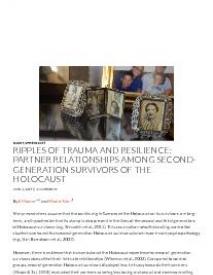RIPPLES OF TRAUMA AND RESILIENCE : PARTNER RELATIONSHIPS AMONG SECOND-GENERATION SURVIVORS OF THE HOLOCAUST
Many researchers assume that the continuing influences of the Holocaust on its survivors are long-term, and hypothesize that its stamp is also present in the lives of the second and third generations of Holocaust survivors (e.g., Shmotkin et al., 2011). This assumption notwithstanding, controlled studies have found that second-generation Holocaust survivors do not report more psychopathology (e.g., Van IJsendoorn et al., 2003).
However, there is evidence that transmission of the Holocaust experience to second- generation survivors does affect their intimate relationships (Wiseman et al., 2002). Compared to control groups, second-generation Holocaust survivors displayed less intimacy towards their partners (Mazor & Tal, 1996); evaluated their partners as being less loving and sexual and more controlling and invasive; perceived the quality of the marriage as inferior; and presented insecure intimate communication patterns (e.g., Joels, 2002). It was concluded that because the massive losses that first-generation Holocaust survivors experienced made it difficult for some to develop new loving, intimate partner-relationships and were less emotionally available to their children, the second-generation internalized a relationship model characterized by low-level intimacy and difficulty with trust. For example, second-generation Holocaust survivors who grew up in families that were silent about their parents’ trauma tended to experience their partners as being more vulnerable and weak, or as controlling and hurtful (Wiseman et al., 2002).
Our study sought to qualitatively examine intergenerational transfer of difficulties in intimacy and explore strength or growth in partner-relationships of the second generation.
In: Kavod: honoring aging survivors. A Journal for Caregivers and Families | 4 | Spring
http://kavod.claimscon.org/2014/06/ripples-of-trauma-and-resilience-partner-relationships-among-second-generation-survivors-of-the-holocaust/
Verschenen 6 juni 2014


